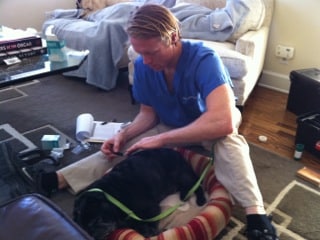The Benefits and Shortcomings of Veterinary House Calls
As a veterinarian with a primarily house call based practice, I see both the benefits and the shortcomings, for both my clients and patients, associated with home pet care.
Merits to the Patient
Almost daily, I travel from house to house providing acupuncture treatments to my patients. Through experience, I’ve discovered that a more ideal outcome from acupuncture occurs in the controlled quarters of familiar household. My biggest challenge is finding the most appropriate space; one that is isolated, comfortable, and free from stimuli that are counterproductive to the acupuncture process (telephones, doorbells, talkative clients, unruly children).
When a veterinarian comes to the house, the pet benefits from not having to leave the safe confines of its own home. The process of being transported to the veterinary hospital is often quite stressful and potentially dangerous for both cats and dogs.
Geriatric, juvenile, mobility compromised, and sick pets are prone to trauma from being shaken around in the car during transportation. On many occasions, I have seen pets suffer injuries as a result of their owners’ lack of enforcement of pet restraint while driving. This primarily occurs when a pet is not appropriately confined and takes a tumble from its standing or seating position following an abrupt stop. Therefore, I suggest all pets be properly restrained in a carrier or seat-belted harness at all times.
Cats must be confined to a sturdy plastic or cardboard carrier, which is typically an unfamiliar situation. Small dogs may also be carrier transported, held by the owner, or actually walk on their own on their own four feet, like your typical medium to large canine companion. Travel and confinement stress can lead to unusual canine and feline behaviors, including panting, vocalizing, restlessness, and inappropriate urination or defecation.
Upon arriving at the veterinary hospital, transitioning from the car to the facility also poses challenges. Large, mobility-challenged dogs may need the help of a technician or stretcher. The new smells and sights experienced after leaving the car are highly stimulating for any pooch. Dogs not well adjusted to leash walking typically will lunge in all directions and compress their neck structures (trachea, esophagus, vertebrae, etc.) if they are pulling on a cervical (neck) collar.
Once inside the hospital, pets can potentially pick up infectious organisms (bacteria, viruses, parasite, etc.). Exposure could come from direct contact with other animals or surfaces that have been contaminated with a microorganism (including the hands and clothing of hospital staff members). After all, hospitals are places of sickness, which puts our pets’ health at risk upon entering.
Benefits to the Client
House calls benefit clients by permitting their pet’s medical evaluation to be done on their own terms. My clients are busy juggling family and career, so the time management advantages of having a familiar face come to their home supersedes any desire to travel through Los Angeles’s traffic laden streets and potentially endure the seemingly inevitable delays that occur in hospital settings.
Additionally, home visitation provides the client more of an opportunity to completely share their perspective on their pet’s current state of health or illness. House call consultations tend to take more time and can be more thorough than in the facility versions. The ability for the veterinarian to closely observe the home environment shared by people and animals lends additional perspective on what may be contributing to a pet’s illness.
One of the most valuable services we house call veterinarians provide is euthanasia. My clients much prefer to have their pets exit this world in the in the comfortable, familiar, and calm environment of their own home instead of the more public and sometimes harried hospital environment.
Shortcomings for the Pet and Client
House call visits often do not permit certain diagnostics to be performed, including radiographs (X-rays), CT scans, MRI, and ultrasound (although portable ultrasound units exist). Additionally, surgical procedures are best done in the more controlled environment of hospital facility (although some veterinarians have surgery-enabled trucks).
Most specialty veterinary care needs to occur within a hospital and is not routinely offered on a house call basis. Nearly all emergency situations, such as severe trauma (lacerations, bite wounds, hit-by-car, etc.), toxicities, allergic reactions, and heat related illnesses also merit hospital-based treatment.
House call veterinary care can be more expensive than in-facility care. This depends on the services being provided, travel, time of day, regional socioeconomics, and other intangible factors.
*
If you are looking for a house call veterinarian, ask for a personal referral from your friends, family, neighbors, or from the veterinarians that have previously treated your pet.

House call based veterinary acupuncture

Acupuncture patient being treated at home]

Getting some appreciation from a patient

Dr. Patrick Mahaney
Image: Getting some appreciation from a patient, by Dr. Patrick Mahaney
